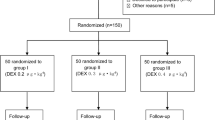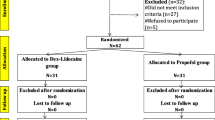Abstract
Purpose
The objective of our study was to compare the safety and efficacy of remifentanil during colonoscopy with those of the standard combination of midazolam and pethidine.
Methods
One-hundred and sixteen consecutive patients scheduled for colonoscopy were randomly assigned to groups A or B. Patients in group A (n = 56) received intravenous (IV) midazolam and pethidine. Patients in group B (n = 60) received IV remifentanil.
Results
Recovery was faster in group B (0 min) than in group A (56 ± 11.3 min) (P < 0.001). There was a marked difference between groups B and A with regard to the time of hospital discharge—28.7 ± 4.3 and 148.9 ± 34 min, respectively (P < 0.001). Patients in group A rated the procedure as comfortable, as also did those in group B. A combination of midazolam and pethidine had a greater affect on patients’ cardiorespiratory characteristics.
Conclusion
Remifentanil during colonoscopy provides sufficient pain relief with better hemodynamic stability, less respiratory depression, and significantly faster recovery and hospital discharge than moderate sedation with midazolam and pethidine.

Similar content being viewed by others
References
Rex DK (2006) Review article: moderate sedation for endoscopy: sedation regimens for non-anaesthesiologists. Aliment Pharmacol Ther 24:163–171
Cohen LB, Wecsler JS, Gaetano JN, Benson AA, Miller KM, Durkalski V, Aisenberg J (2006) Endoscopic sedation in the United States: results from a nationwide survey. Am J Gastroenterol 101:967–974
Paspatis GA, Manolaraki M, Xirouchakis G, Papanikolaou N, Chlouverakis G, Gritzali A (2002) Synergistic sedation with midazolam and propofol versus midazolam and pethidine in colonoscopies: a prospective, randomized study. Am J Gastroenterol 97:1963–1967
Bailey PL, Pace NL, Ashburn MA, Moll JW, East KA, Stanley TH (1990) Frequent hypoxemia and apnea after sedation with midazolam and fentanyl. Anesthesiology 73:826–830
Patel S, Vargo JJ, Khandwala F, Lopez R, Trolli P, Dumot JA, Conwell DL, Zuccaro G (2005) Deep sedation occurs frequently during elective endoscopy with meperidine and midazolam. Am J Gastroenterol 100:2689–2695
Rex DK (2004) The science and politics of propofol. Am J Gastroenterol 99:2080–2083
Cohen LB, Dubovsky AN, Aisenberg J, Miller KM (2003) Propofol for endoscopic sedation: A protocol for safe and effective administration by the gastroenterologist. Gastrointest Endosc 58:725–732
Paspatis GA, Charoniti I, Manolaraki M, Vardas E, Papanikolaou N, Anastasiadou A, Gritzali A (2006) Synergistic sedation with oral midazolam as a premedication and intravenous propofol versus intravenous propofol alone in upper gastrointestinal endoscopies in children: a prospective, randomized study. J Pediatr Gastroenterol Nutr 43:195–199
Koch ME, Gevirtz C (2004) Propofol may be safely administered by trained nonanesthesiologists. Con: Propofol: far from harmless. Am J Gastroenterol 99:1208–1211
Bell GD, Quine A (2006) Preparation, premedication, and surveillance. Endoscopy 38:105–109
Lazzaroni M, Bianchi Porro G (2005) Preparation, premedication, and surveillance. Endoscopy 37:101–109
Qadeer MA, Vargo JJ, Khandwala F, Lopez R, Zuccaro G (2005) Propofol versus traditional sedative agents for gastrointestinal endoscopy: a meta-analysis. Clin Gastroenterol Hepatol 3:1049–1056
VanNatta ME, Rex DK (2006) Propofol alone titrated to deep sedation versus propofol in combination with opioids and/or benzodiazepines and titrated to moderate sedation for colonoscopy. Am J Gastroenterol 101:2209–2217
Cohen LB (2006) The future of endoscopic sedation. Proceedings of the 3rd annual endoscopic sedation meeting. New York, pp 3–4
Moerman AT, Foubert LA, Herregods LL, Struys MM, De Wolf DJ, De Looze DA, De Vos MM, Mortier EP (2003) Propofol versus remifentanil for monitored anaesthesia care during colonoscopy. Eur J Anaesthesiol 20:461–466
Bouvet L, Allaouchiche B, Duflo F, Debon R, Chassard D, Boselli E (2004) Remifentanil is an effective alternative to propofol for patient-controlled analgesia during digestive endoscopic procedures. Can J Anaesth 51:122–125
Lauwers M, Camu F, Breivik H, Hagelberg A, Rosen M, Sneyd R, Horn A, Noronha D, Shaikh S (1999) The safety and effectiveness of remifentanil as an adjunct sedative for regional anesthesia. Anesth Analg 88:134–140
Keats AS (1978) The ASA classification of physical status–a recapitulation. Anesthesiology 49:233–236
Aldrete JA (1995) The post-anesthesia recovery score revisited. J Clin Anesth 7:89–91
Chung F, Chan VW, Ong D (1995) A post-anesthetic discharge scoring system for home readiness after ambulatory surgery. J Clin Anesth 7:500–506
Revill SI, Robinson JO, Rosen M, Hogg MI (1976) The reliability of a linear analogue for evaluating pain. Anaesthesia 31:1191–1198
Servin F, Desmonts JM, Watkins WD (1999) Remifentanil as an analgesic adjunct in local/regional anesthesia and in monitored anesthesia care. Anesth Analg 89:S28–S32
Rudner R, Jalowiecki P, Kawecki P, Gonciarz M, Mularczyk A, Petelenz M (2003) Conscious analgesia/sedation with remifentanil and propofol versus total intravenous anesthesia with fentanyl, midazolam, and propofol for outpatient colonoscopy. Gastrointest Endosc 57:657–663
Akcaboy ZN, Akcaboy EY, Albayrak D, Altinoren B, Dikmen B, Gogus N (2006) Can remifentanil be a better choice than propofol for colonoscopy during monitored anesthesia care? .Acta Anaesthesiol Scand 50:736–741
Glass PS, Gan TJ, Howell S (1999) A review of the pharmacokinetics and pharmacodynamics of remifentanil. Anesth Analg 89:S7–S14
Avramov MN, Smith I, White PF (1996) Interactions between midazolam and remifentanil during monitored anesthesia care. Anesthesiology 85:1283–1289
Gold MI, Watkins WD, Sung YF, Yarmush J, Chung F, Uy NT, Maurer W, Clarke MY, Jamerson BD (1997) Remifentanil versus remifentanil/midazolam for ambulatory surgery during monitored anesthesia care. Anesthesiology 87:51–57
Bahal-O’Mara N, Nahata MC, Murray RD, Linscheid TR, Williams T, Heitlinger LA, Li BU, McClung HJ, Lininger B (1993) Efficacy of diazepam and meperidine in ambulatory pediatric patients undergoing endoscopy: a randomized, double-blind trial. J Pediatr Gastroenterol Nutr 16:387–392
Greilich PE, Virella CD, Rich JM, Kurada M, Roberts K, Warren JF, Harford WV (2001) Remifentanil versus meperidine for monitored anesthesia care: a comparison study in older patients undergoing ambulatory colonoscopy. Anesth Analg 92:80–84
Author information
Authors and Affiliations
Corresponding author
Rights and permissions
About this article
Cite this article
Manolaraki, M.M., Theodoropoulou, A., Stroumpos, C. et al. Remifentanil Compared with Midazolam and Pethidine Sedation During Colonoscopy: A Prospective, Randomized Study. Dig Dis Sci 53, 34–40 (2008). https://doi.org/10.1007/s10620-007-9818-0
Received:
Accepted:
Published:
Issue Date:
DOI: https://doi.org/10.1007/s10620-007-9818-0




